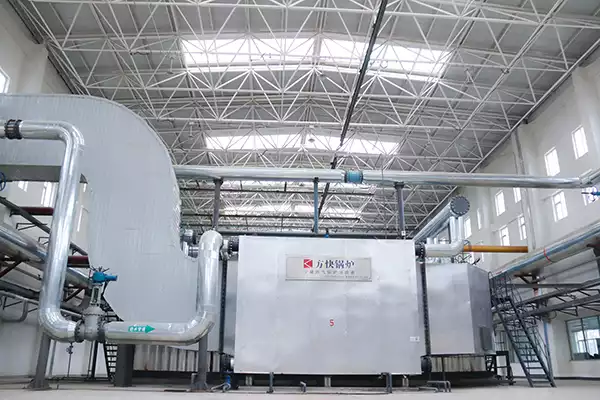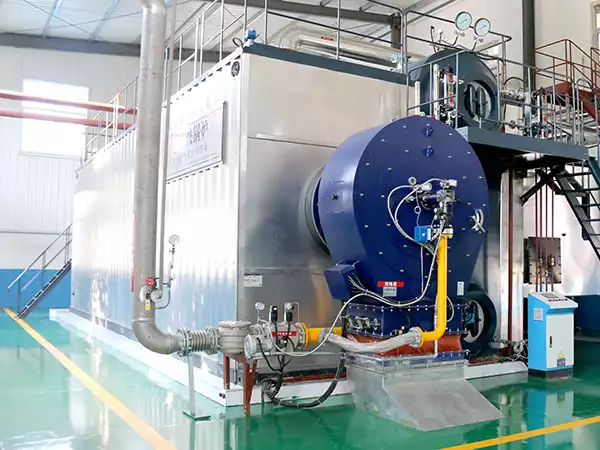Fire tube boilers are a popular type of boiler used in a wide range of applications, from heating buildings to generating steam for industrial processes. In this article, we will explore what fire tube boilers are, how they work, and some of their common applications.
What are Fire Tube Boilers?
Fire tube boilers are a type of boiler that use hot gases generated by combustion to transfer heat to water. The heat is then used to produce steam, which can be used for a variety of applications. Fire tube boilers have cylindrical shells containing tubes that are surrounded by water. The combustion gases flow through the tubes, heating the water surrounding them.
Fire tube boilers can be further categorized into two types: horizontal and vertical. In horizontal fire tube boilers, the tubes run horizontally, while in vertical fire tube boilers, the tubes run vertically.
Need a new boiler?
How do Fire Tube Boilers Work?
In a fire tube boiler, the hot gases from the combustion process pass through the tubes and heat the water surrounding them. The heated water then rises to the top of the boiler and is collected in the steam drum, where it is separated from the steam. The steam is then used for various applications, while the water is returned to the boiler to be heated again.
Fire tube boilers typically have a lower water content than water tube boilers, which means they can respond to load changes more quickly. They are also generally simpler to operate and maintain than water tube boilers, making them a popular choice for many applications.
What are the advantages of using a fire tube boiler over other types of boilers?
Fire tube boilers offer several advantages over other types of boilers. Some of the key advantages include:
- Simplicity: Fire tube boilers are relatively simple in design, which makes them easy to operate and maintain. They do not require complex water treatment systems or other complicated equipment, which can help reduce maintenance costs.
- Affordability: It is generally less expensive than other types of boilers, which can make them an attractive option for applications where cost is a primary concern.
- Versatility: Can be used in a wide range of applications, including heating, power generation, and industrial processes. They can also be used with a variety of fuels, including natural gas, oil, and biomass.
- Quick Response: Fire tube boilers have a lower water content than other types of boilers, which means they can respond to load changes more quickly. This makes them a good choice for applications where rapid response times are important.
- Availability: It is widely available and can be purchased from a variety of manufacturers. This can make it easier to find a boiler that meets your specific needs and budget.

Fire tube boilers offer several advantages over other types of boilers.
What are the disadvantages of using a fire tube boiler?
While fire tube boilers offer several advantages, there are also some disadvantages to consider. Some of the key disadvantages include:
- Lower Efficiency: Fire tube boilers are generally less efficient than other types of boilers, such as water tube boilers. This is because they have a lower surface area for heat transfer, which means they are less effective at transferring heat from the combustion gases to the water.
- Limited Pressure Capacity: Fire tube boilers have limited pressure capacity compared to water tube boilers. This means they may not be suitable for applications that require very high steam pressures.
- Risk of Explosion: Fire tube boilers operate at high temperatures and pressures, which can increase the risk of explosion or other safety hazards. Proper safety measures, such as regular maintenance and inspections, must be taken to minimize the risk of accidents.
- Poor Water Quality: This can be sensitive to poor water quality, which can cause corrosion or other damage to the boiler components. This means that proper water treatment is essential to ensure the longevity and reliability of the boiler.
- Limited Flexibility: It is often designed for specific applications and may not be easily adapted for other uses. This can limit their flexibility and make them less suitable for applications that require frequent changes or modifications.
Overall, while fire tube boilers offer several advantages, they may not be the best choice for all applications. It is important to carefully consider your needs and requirements, as well as the advantages and disadvantages of different types of boilers, before selecting a boiler for your facility. Consulting with a qualified professional can also help ensure that you choose the right boiler for your needs.
Get FREE Boiler Quotes
- ✔Get FREE Local Boiler Quotes today
- ✔Compare The Best Prices
- ✔Save Money On Your New Boiler Today!
What are some common applications of fire tube boilers?
| Application | Description |
|---|---|
| Heating and Domestic Hot Water | Used in residential and commercial heating systems to provide heat and domestic hot water. Often used in apartment buildings, hotels, and hospitals. |
| Power Generation | Used in power generation applications, such as steam turbines and power plants. Often used in conjunction with other types of boilers, such as water tube boilers, to generate electricity. |
| Process Heating | Used in industrial process heating applications, such as food processing, chemical processing, and manufacturing. Well-suited for applications that require high temperature and pressure. |
| Marine Industry | Used in marine applications, such as ships and offshore platforms. Often used to provide steam for propulsion and other onboard systems. |
| Agriculture | Used in agriculture for applications such as greenhouse heating, poultry farming, and livestock feed processing. |
| Distilleries and Breweries | Used in distilleries and breweries to provide steam for the production of alcoholic beverages. |
This table summarizes some common applications of fire tube boilers in various industries.
Conclusion
Fire tube boilers are a versatile and popular type of boiler used in a wide range of applications. They are relatively simple to operate and maintain and can be used to produce steam for heating, power generation, and industrial processes. While there are some drawbacks to using fire tube boilers, they remain a popular choice due to their affordability, versatility, and ease of use. If you are considering a fire tube boiler for your application, be sure to carefully consider your needs and choose a boiler that meets your specific requirements.

Looking for boilers with sophisticated manufacturing, great quality?
Fangkuai boiler can always provide what you want.


